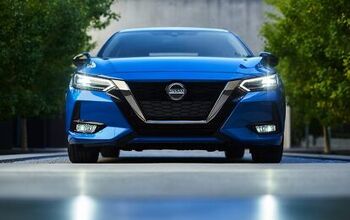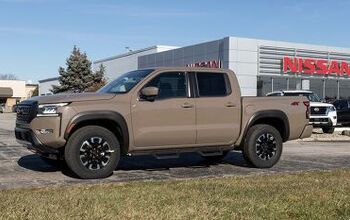Nissan's Bad Year Greenlit for a Sequel

Nissan is bracing for a bad year. On Tuesday, the automaker held a press conference at its headquarters in Yokohama, Japan, to tell the world that it’s forecasting a 28-percent decline in operating profit this year. While that sounds bad, it comes on the heels of the company’s financial results for the 12-month period ending March 31st, 2019 — which was a dumpster fire.
Operating profit plunged 45 percent to 318 billion yen ($2.9 billion), while revenue fell 3 percent to about 11.6 trillion yen ($105 billion). Vehicle sales were down 4.4 percent. “Today we have hit rock bottom,” CEO Hiroto Saikawa told the press, suggesting the company could rebound in a few years.
Saikawa attributes much of the automotive firm’s current woes to the “negative legacy of our old leader” Carlos Ghosn, whose reputation was defiled by the findings of an internal investigation. The ousted chairman claims the probe, and the allegations stemming from it, were a corporate coup set up to remove him from power and halt a potential merger between Nissan and alliance partner Renault.
Ironically, Ghosn was universally championed as the man who saved Nissan from the brink of disaster in 2002. He’s now under constant supervision by Japanese authorities while awaiting trial.
However, as good as the company falling apart in his absence makes things look for Ghosn, some of Nissan’s current issues are the direct result of his decisions. During his tenure, Ghosn set wildly aggressive sales targets that forced the company to become largely dependent on incentivizing in the United States — making for razor-thin margins. While not much of a concern when sales were strong, the brand’s U.S. volume fell by 9.3 percent last year.
Another ghost that has come back to haunt Nissan is the aforementioned merger push. During the conference, Saikawa addressed the ongoing amalgamation concerns. “[Renault chairman Jean-Dominique Senard] has one idea in mind, which is integration or merger,” he said. “What we’ve told Mr. Senard is this is not the right timing to discuss this matter,” noting that he and other Japanese executives have consistently been opposed to the idea.
Nissan’s dismal fiscal performance and the CEO’s ominous predictions led reporters to ask whether Saikawa would step down — something he planned to do prior to Ghosn’s arrest, possibly due to rumors that he was to be fired by the former chairman. Saikawa reneged on that promise after Ghosn’s November arrest. According to Reuters, he was noncommittal at the press conference.
“Timing is a matter I need to decide,” he said, adding that he would step down “at the appropriate time” and had nothing further to say on the matter.
[Image: Anton Watman/Shutterstock]

A staunch consumer advocate tracking industry trends and regulation. Before joining TTAC, Matt spent a decade working for marketing and research firms based in NYC. Clients included several of the world’s largest automakers, global tire brands, and aftermarket part suppliers. Dissatisfied with the corporate world and resentful of having to wear suits everyday, he pivoted to writing about cars. Since then, that man has become an ardent supporter of the right-to-repair movement, been interviewed on the auto industry by national radio broadcasts, driven more rental cars than anyone ever should, participated in amateur rallying events, and received the requisite minimum training as sanctioned by the SCCA. Handy with a wrench, Matt grew up surrounded by Detroit auto workers and managed to get a pizza delivery job before he was legally eligible. He later found himself driving box trucks through Manhattan, guaranteeing future sympathy for actual truckers. He continues to conduct research pertaining to the automotive sector as an independent contractor and has since moved back to his native Michigan, closer to where the cars are born. A contrarian, Matt claims to prefer understeer — stating that front and all-wheel drive vehicles cater best to his driving style.
More by Matt Posky
Latest Car Reviews
Read moreLatest Product Reviews
Read moreRecent Comments
- V8fairy Not scared, but I would be reluctant to put my trust in it. The technology is just not quite there yet
- V8fairy Headlights that switch on/off with the ignition - similar to the requirement that Sweden has- lights must run any time the car is on.Definitely knobs and buttons, touchscreens should only be for navigation and phone mirroring and configuration of non essential items like stereo balance/ fade etc>Bagpipes for following too close.A following distance warning system - I'd be happy to see made mandatory. And bagpipes would be a good choice for this, so hard to put up with!ABS probably should be a mandatory requirementI personally would like to have blind spot monitoring, although should absolutely NOT be mandatory. Is there a blind spot monitoring kit that could be rerofitted to a 1980 Cadillac?
- IBx1 A manual transmission
- Bd2 All these inane posts (often referencing Hyundai, Kia) the past week are by "Anal" who has been using my handle, so just ignore them...
- 3-On-The-Tree I was disappointed that when I bought my 2002 Suzuki GSX1300R that the Europeans put a mandatory speed limiter on it from 197mph down to 186mph for the 2002 year U.S models.


































Comments
Join the conversation
Nissan (and Mitsubishi) used to be only slightly worse than their rivals. They were not as good as Toyota and Honda, but they weren't far behind. It seems that Mitsubishi fell off a pretty steep cliff during or after the DSM project, followed by Nissan - probably due largely to the CVT. I've owned a bunch of Nissan and Infiniti cars and trucks, and they have all served me very well. I've also owned a number of Toyota, Lexus, Mitsubishi, BMW, Mercedes, and occasionally domestic vehicles - so I have examples for comparison. I still get Nissans as rentals fairly frequently and I still enjoy the comfort and relative performance of the Maxima and even the Altima. I get the feeling that they are underappreciated. I avoid owning them due to CVT reliability concerns, but I don't even know if that is still an issue. All of that to say, as a consumer, I don't buy new Nissans any longer and it isn't due to Ghosn's legal status, it is due to mostly to the CVT and partially due to percieved quality issues that I didn't see prior to Ghosn's salvation of Nissan.
Get rid of the XTerra and let the Frontier rot as sales of trucks and SUV's blow up. Why buy a new Frontier when you can get a 2010, which is practically the same vehicle?